- Home
- Linda Newbery
Catcall Page 13
Catcall Read online
Page 13
‘What, the Cotswold Wildlife Park?’ Dad said. ‘No, there’s no way he could do that. It’s miles out in the country. No buses or trains go there.’
Mum asked Kevin why he’d thought of that, but Kevin shrugged and said, ‘Just an idea.’
But Kevin’s guess was closer than anyone else’s. How hadn’t I guessed? Jamie was trying to get to London Zoo. By now his description had been circulated and police were out looking for him in patrol cars. We’d been to the zoo three years ago and Jamie knew it was in Regent’s Park, so he’d bought an Underground ticket and got on the Metropolitan line as far as King’s Cross. Here he got himself confused, and didn’t know where to go next (I could have told him, you want Camden Town for the zoo, couple of stops on the Northern line), and he was standing in a dither when a kind woman saw him on his own and thought he might be in trouble. When she asked where his mum and dad were, he burst into tears and ran off towards the Hammersmith and City line. The woman was concerned and called the police on her mobile, just in case Jamie was a Missing Person. Which he was, by then. Small boy on his own, thick brown hair, brown eyes, blue jeans, navy anorak, may be frightened or upset. A policeman spotted him at Baker Street Underground.
I stayed in hospital for two more nights. I was kept busy with meals and washing, exercises and injections and visitors, but there was also plenty of time for thinking. And I saw a weird Jamie-logic in everything he’d done.
The lion had scared him by looking at him, but it was really his own thoughts that frightened him. I’d tried to help by saying that flames would send the lion away, the lion of his dreams, but that backfired on me when Jamie did the obvious thing–to him, anyway–and burned my book, with its staring cats’ eyes. Now the zoo.
‘Why the zoo, Jame?’ I asked, next time he visited.
‘See a lion. See if it worked,’ he said, in an isn’t-it-obvious kind of way. ‘See if I could just look at it, and then look at monkeys and giraffes.’ He was more interested in the Chelsea magazine he’d brought me.
He’d been to the child psychologist that afternoon, with Mum and Dad. It didn’t sound nearly as serious as I’d expected–he’d drawn pictures and played games, that was all, and he was going again next week. But the running away, and my accident, seemed to have shocked him back into himself. He was much more like my brother Jamie. I was sent home from hospital and had the rest of the week off school, and Jamie and I played chess and PlayStation and watched TV in the afternoons when he came in.
On Thursday, Noori and Brody came round, with a big get-well card signed by everyone in the form. Brody said he was sorry for stirring things up and I said I was sorry for starting the fight, and they both tried out my crutches. Floss turned up as well, bringing me a book called The Dreamfighter, and said, ‘Hey! Let’s play standing-long-jump,’ which turned out to be a game even I could join in. What you do is, you make a start line–we used the edge of the rug–and each player in turn takes one swing with the crutches from a standing start, and you mark carefully where the heel of their back foot lands. Noori had just set a new record when Mum heard the laughing and cheering and came to tell me that people recovering from concussion shouldn’t be having quite so much fun. Mike was home from work by then, and he started showing us how to juggle with three apples. Brody was best, and got so keen on it that we couldn’t make him stop. So Mike got pencil and paper and drew a cartoon of Brody juggling, with a look of panic on his face, and ten arms whizzing out so that he looked like a helicopter. Brody had seen Mike’s cartoons before, but Floss and Noori hadn’t, and they wanted Mike to draw them too. They all ended up staying for Mike’s home-made pizza and ice-cream, and it was as good as a party. Jamie was doing his funny laugh, his hic-hic-a-hic-a-hicca-hic, and I knew we were getting him back.
And when I went up to bed, and saw a cat-shaped purring hump under Jamie’s duvet that Mum would never allow if she found out, I knew that Splodge knew, too.
Jamie had given back my Christmas money, and on our next weekend in High Wycombe Dad took us to a big department store. Kevin, too. By now I could reach turbo speed on my crutches, and people scattered out of my way and held doors open and smiled. I think Jamie and Kevin were a little bit envious. After I’d chosen my binoculars (Viking 8x25, compact, waterproof), Jamie wanted to buy me a new notebook to make up for the one he’d burned. I think it was really Dad’s idea, not Jamie’s, but Jamie was happy to go along with it.
We stood and looked at the shelves and all the books on display–lots of them girly and sparkly, some of them plain, some with photos or stripes or logos.
‘You can have whatever one you want,’ Jamie told me.
We spent a long time looking. Eventually I chose a sketchpad, so that I could do a collage on the cover, like last time. Course, it was only an empty book–it wouldn’t make up for all that was lost. But I couldn’t help feeling a tingle of excitement when I thought about the smooth, grainy sheets waiting to be filled, and how special it would be when I’d made it mine. I thought about all the things I didn’t know yet that would find their way into those pages.
26
BEING ALIVE
Equinox. We’d reached the spring equinox, which Dad said was one of the year’s marker-posts–the day when night and day are the same length, and the days are going to stretch out now into summer.
For Jennie, everything was a marker-post as the year went round. Everything was a first. She was three months old now, and could smile and make little exclaiming or chuckling noises. She was starting to lift her head and turn it to look at things. She could hold her plastic duck for a few moments. She could grab hold of one of her feet, and we thought she knew it belonged to her. Next thing, according to Mum’s book, she’d start trying to sit up, to get a different view of the world. Most evenings now, after she’d had her bath, Jamie read her a story. Of course she didn’t understand, but she seemed to like Jamie talking to her and helping to put her to bed. Sometimes I did the reading, because Jamie still liked having a story read to him. And sometimes Mum or Mike read to all three of us.
Every afternoon, as soon as I got home from school, I spent some time with Jennie. I loved watching her notice things, wondering what she thought. It fascinated me that she was Jennie, she was herself and the self she would grow into (where had she come from? Where was she going?), but she was also a fully-programmed human being. Somewhere inside her, ready, was all this instinct that had been instinct for as long as humans were humans. Instinct would tell her when it was time to crawl, when to push herself up to her feet, when to trust and when to be frightened, how to listen and learn and try new things. And she already knew how to make people love her and look after her.
When I held her, I thought of everything she’d have to do as she got older–all the fun and the hurts and the frustrations and the wonder, the falling ill and the getting better, the making friends and enemies, the breaking and the mending. It seemed too much for one small baby to have to face. But when I said this to Mum, or at least something like it, she laughed. ‘But that’s what being alive is made of, Joshie. No one has to live their whole life all at once. It’ll wait till she’s ready.’
My leg was out of plaster now and I’d had to give the crutches back, which was a pity, really–I’d got used to them. A scar above my ankle was all that was left from my accident. I’d even be doing PE again soon.
After his first visit to the child psychologist, Jamie went a few more times. Once Mike and Mum went without Jamie, and twice Dad took Jamie, and once I went. It wasn’t nearly as interesting as I’d expected. The psychologist was only an ordinary person, a woman with red curly hair and shiny shoes and a silver dolphin brooch on her jacket. Instead of couches and bright lights and electrodes and diagrams of the brain, her consulting room was full of cushions and toys and books. We just talked a bit, then went home. Soon there was no need for any of us to go any more. Jamie had liked the first few visits, but now he was bored.
Because Jamie had been tryin
g to get to London Zoo to look at the lions, Dad took us back to the wildlife park. We enjoyed it, but the lions weren’t doing much this time. I didn’t tell Dad, but I’d far rather go to the South Kruger National Park and see them in the wild. Jamie looked at the lions and went back a second time to see if they’d woken up, but he was more interested in the giant tortoises, big enough to ride on, and the red pandas, who were sleeping in their trees–‘Like ripe plums,’ Dad said.
None of the animals spoke to Jamie, or if they did he didn’t seem to think it was important.
Kev and I spent the weekend after the equinox with Dad–digging, mainly. We were making a pond in Dad’s back garden. It took an awful lot of digging, and even when the hole looked deep enough for a small pond, Dad said he wanted it twice the size. We dug and we dug and we dug some more, getting filthy and tired. You wouldn’t believe how much soil you dig out when you start making even a middling-sized hole. We collected bucket-loads of stones, and we carted the soil away in barrows and piled it in one corner, for Dad to use on the garden. I imagined a pond with reed-fringed edges, damselflies hovering over the water, and newts and frogs poking their heads out. Dad said he couldn’t think of anything better than turning a patch of grass into such a rich habitat. ‘They’ll all find their way here, the damselflies and the amphibians,’ he said, ‘if we make it their kind of place.’
We didn’t spend all weekend digging. It was Kevin’s birthday on the Sunday and Kim took him paintballing with his friends. Jamie and I went too. We’re OK, Kev and Jamie and me. Kevin’s shy, Dad says, and that can look like unfriendliness at first. But he’s sort of family. We’re three Js and a K, and we’re used to that now.
I wrote about the pond in my new notebook, leaving space for before-and-after photos. I was going to do the Edwardian Lady thing, and note down the dates–first dragonfly, first frog, first bird or hedgehog drinking pond water.
This book had turned out differently from the first one. The night we bought it, I started collaging the cover. Even though Jamie hadn’t had any more dreams about staring cats, it didn’t seem a good idea to do the eyes this time. I’d do habitats.
Dad was always giving me National Geographic magazines, so it wasn’t hard to find forests and drinking-holes and desert and savannah and scrub. I began searching for letters to cut out for the title, Book of Cats, but then I stopped and looked at what I’d got.
There was no point trying to re-make the book I’d made before. I had a special liking for the cat family and probably always would, but maybe I should move on now. This book didn’t know what it wanted to be, yet. After all, there was the rest of the animal kingdom, not to mention the world, the solar system, the universe, infinity. And I only had one life to discover it all.
So I called it Josh’s Book of Everything.
ACKNOWLEDGEMENTS
The poem Floss gives Josh is ‘The Jaguar’ by Ted Hughes, first published in The Hawk in the Rain, 1957. Ted Hughes is also the author of The Dreamfighter (Faber, 2003), the book Floss lends Josh after his accident. The creation story Josh writes in his new notebook on Chapter 26 is his version of the beginning of How the Whale Became, the first section of The Dreamfighter.
In the interests of accuracy (at the time of writing), the Asian lioness at the Cotswold Wildlife Park last gave birth to cubs in 1999. These lions are part of an international breeding programme, and the two cubs born then are now in zoos in Frankfurt and Nürnberg.
ABOUT THE AUTHOR
Winner of the 2006 Costa Children’s Book of the Year Award for her novel Set in Stone, Linda Newbery is the author of more than thirty highly-acclaimed books for readers of all ages.
Linda wanted to be an author from the age of eight. She now writes full-time from her home in Northamptonshire, and is much in demand as a speaker in schools and libraries and at festivals and conferences.
For more information about Catcall, and Linda’s other books, visit www.lindanewbery.co.uk.
Also by Linda Newbery
The Shell House
Sisterland
At the Firefly Gate
Lost Boy
Set in Stone
Praise for Catcall:
‘A highly enjoyable book written with a lot of humour, very strong characters…I would recommend it to anyone.’
Teen Titles
‘A very strong psychological drama…Josh and Jamie are battling demons that most children will recognise as demons of their own.’
The Bookbag
‘I thoroughly enjoyed this book…The characters are believable, the problem is well depicted; the tension it creates is tangible, and the solution comes as a great relief.’
Write Away
‘Presents a moving and insightful portrayal of a common family situation, given extra dramatic tension by Jamie’s lion persona and by the links between animal and human behaviour as observed by Josh, a thoughtful, sympathetic narrator who grows in empathy and self-knowledge in a very satisfying way.’
The School Librarian
Catcall has been recommended by Adèle Geras in Time Out’s 1000 Books to Change Your Life.
A DAVID FICKLING BOOK
Published by David Fickling Books
an imprint of Random House Children’s Books
a division of Random House, Inc.
New York
This is a work of fiction. Names, characters, places, and incidents either are the product of the author’s imagination or are used fictitiously. Any resemblance to actual persons, living or dead, events, or locales is entirely coincidental.
Text copyright © 2008 by Linda Newbery
Illustrations copyright © 2008 by Ian P. Benfold Haywood
All rights reserved.
Originally published in Great Britain by Orion Children’s Books, a division of the Orion Publishing Group Ltd, in 2006.
David Fickling Books and colophon are trademarks of David Fickling.
Visit us on the Web! www.randomhouse.com/kids
Educators and librarians, for a variety of teaching tools, visit us at www.randomhouse.com/teachers
Library of Congress Cataloging-in-Publication Data is available on request.
Random House Children’s Books supports the First Amendment and celebrates the right to read.
eISBN: 978-0-375-89152-6
v3.0

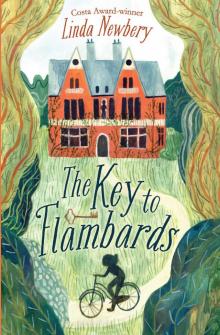 The Key to Flambards
The Key to Flambards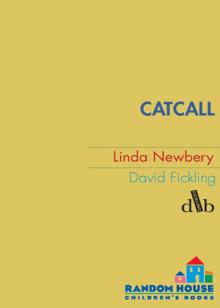 Catcall
Catcall Sisterland
Sisterland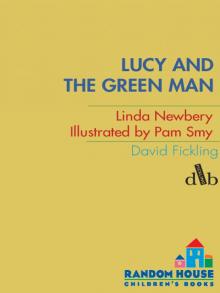 Lucy and the Green Man
Lucy and the Green Man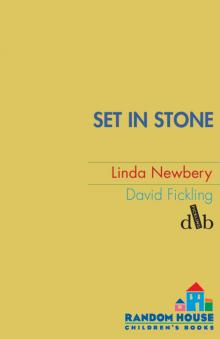 Set In Stone
Set In Stone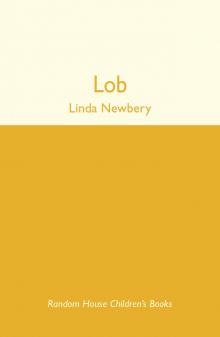 Lob
Lob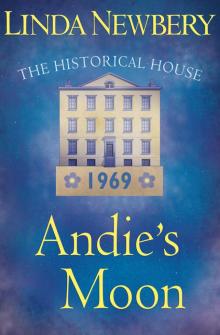 Andie's Moon
Andie's Moon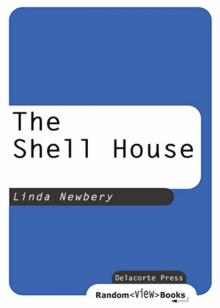 The Shell House
The Shell House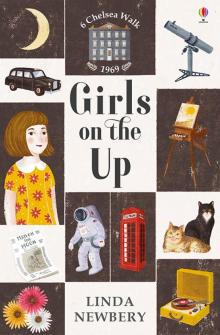 Girls on the Up
Girls on the Up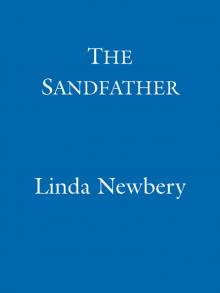 The Sandfather
The Sandfather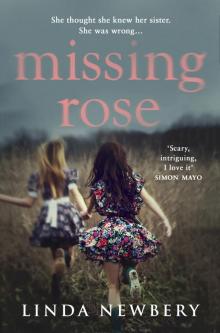 Missing Rose
Missing Rose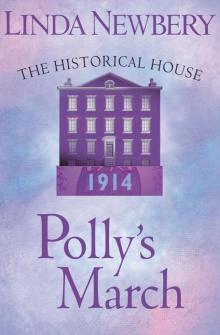 Polly's March
Polly's March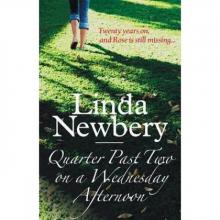 Quarter Past Two on a Wednesday Afternoon
Quarter Past Two on a Wednesday Afternoon Flightsend
Flightsend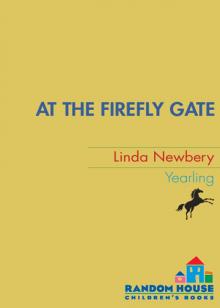 At the Firefly Gate
At the Firefly Gate